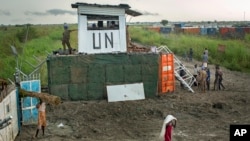The United Nations Security Council on Tuesday renewed the mandate of the U.N. Mission in South Sudan (UNMISS) for six months.
The renewed mandate maintains UNMISS's focus on protecting civilians, monitoring and investigating human rights violations, facilitating humanitarian access, and supporting moves to implement a cessation of hostilities agreement signed in January.
The Security Council included a request in the new mandate for UNMISS to increase its interaction with communities in order to help improve its early warning and response efforts, and head off new violence. It also includes a provision for more female police personnel in the mission. Details as to why more women have been requested were not immediately available.
The new mandate also calls for enhanced efforts by UNMISS to ensure the safety of air operations in South Sudan. An UNMISS helicopter carrying cargo from Wau in Western Bahr el Ghazal to Bentiu in Unity state was shot down in August, killing three of the four Russian crew members on board.
South Sudan envoy praises UN
The renewed mandate drew praise from South Sudan’s ambassador to the United Nations, Francis Mading Deng, together with a plea for the world body not to join the United States, European Union and Canada and impose sanctions on South Sudan.
A sustainable solution to the current crisis in South Sudan cannot be achieved by the imposition of sanctions.Francis Mading Deng, South Sudan UN Ambassador
"A sustainable solution to the current crisis in South Sudan cannot be achieved by the imposition of sanctions, which is now being talked about," Deng said in a statement.
Deng said sanctions have historically been shown to harden the positions of warring sides, and make them more confrontational instead of pushing them towards cooperation and peace.
The head of the Security Council for November, Australian Ambassador to the U.N., Gary Quinlan, earlier this month said there was "... considerable interest among many Council members to look very closely at applying targeted sanctions and also, for many, an arms embargo" on South Sudan.
Deng called on the international community to play a positive role in South Sudan’s slow-moving peace process by helping both parties to reach an agreement.
He cited as a good model the international community’s involvement in the peace process that led to the Comprehensive Peace Agreement of 2005, which ended the long civil war in Sudan and eventually led to independence for South Sudan.




